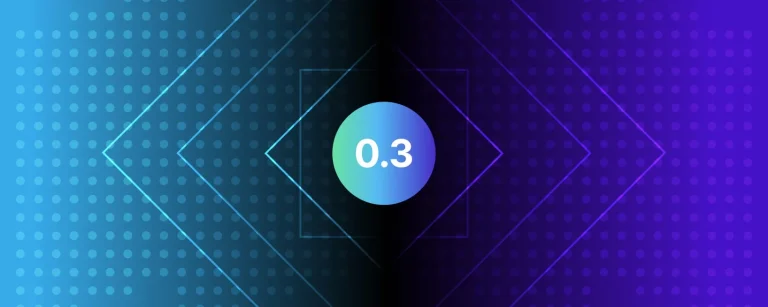We recently announced Materialize, a real-time streaming SQL database that powers production applications. The latest release of Materialize, version 0.3, was published on June 1, 2020.
important
Materialize was first developed as a single downloadable binary. Early in 2022, we decided it was time to unbundle Materialize into a distributed system to unlock the next phase of scale. If you’re interested in trying Materialize for yourself, register for access here!
Materialize lets you ask questions in real-time of your streaming data and get the latest answers back in milliseconds — offering the power and flexibility of a SQL database, but scaling to handle the throughput of tens of thousands of updates per second. Materialize is powered by Timely Dataflow.
Here is a quick overview of the main features in 0.3.
What’s Changed in Materialize 0.3
Materialize 0.3 reflects our learnings and improvements as customers stress-test Materialize under high-throughput scenarios (some of our partners have multiple years of transaction history)!
We’ve made many under the hood refinements in v0.3. Materialize aims to be fully compatible with ANSI SQL, and we’ve been testing ourselves against CH-Benchmark, an emerging industry-standard. Release 0.3 improves Materialize’s stability and performance under real-world SQL scenarios we’ve encountered with customers, such as error handling for file sources that can’t be read properly, and runtime error handling.
Correctness and consistency guarantees provided by Materialize are critical to us, but we also understand that in the real-world, the consistency of databases and data streams may not always be so ideal. Our customers often use change data capture systems such as Debezium can create transaction streams over Kafka from databases like MySQL or Postgres, which are then fed into Materialize as input sources. However, these upstream sources may crash or uncleanly restart. To that end, we’ve improved support for scenarios where upstream sources of Materialize send duplicate events, or events that were part of the same transaction have different timestamps.
We aim to make Materialize easy to get started and minimize your operational complexity. In our latest release, we’ve further polished TAIL, which continuously updates you on changes that occur to a source or view, allowing you to follow along with ingestion progress. (TAIL exposes some features unique to Materialize, so follow along here for more documentation to come). To further improve observability within Materialize, we’ve exposed health checks, export stream ingestion progress as metrics, and created a pre-configured Grafana dashboard.
Support for AWS Kinesis sources and enterprise security
Based on customer feedback, we now support ingesting of JSON over AWS Kinesis streams. (JSON over Kafka is also supported now; docs coming soon)
To support enterprise security requirements, we’ve also added support for SSL and connecting to Kafka clusters over Kerberos.
What’s Coming in 0.4
Our product roadmap continues to evolve based on customer and community feedback. Please get in touch if you’d like to chat more!
Foundations for source data persistence
To provide repeatability for materialized views and avoid having to re-read source data across restarts, we will add support for continuously replicating source data to tiered storage. This will be a multi-release process, but expect to see some progress in 0.4!
Continuing to evolve sinks
Streaming data from a varied set of sources is just one half of the equation. In release v0.4, we’re making it even quicker and easier to stream data from Materialize to various sinks.
Reliability and resilience
We’re continuing to improve Materialize’s resilience to failures on dependencies, such as unexpected data formats and network issues. As we increase test coverage, run larger load tests, and simulate more complex failure scenarios, we’ll continue to solve the issues we discover as well.
Get started today
The full release notes for 0.3 are located here. Download Materialize today to get faster answers to your data questions, check out our source code on Github, or try out a pre-built demo!
We are also hiring software engineers and SREs! We’re headquartered in New York City, but the SRE position is remote-friendly.



